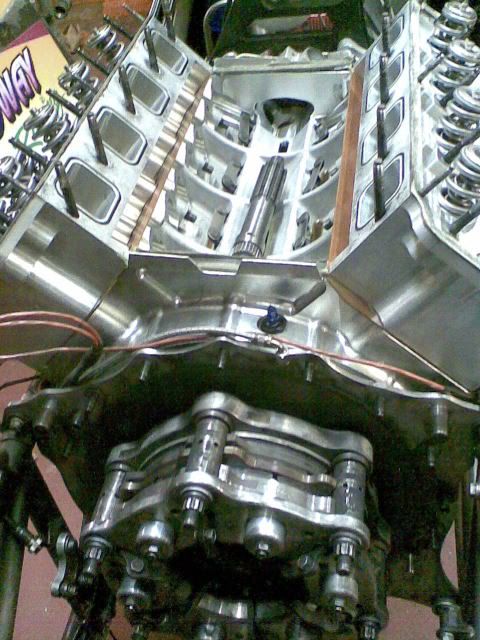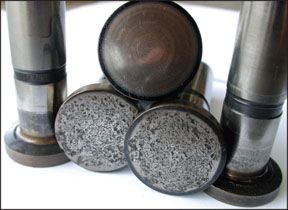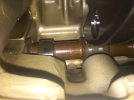You are using an out of date browser. It may not display this or other websites correctly.
You should upgrade or use an alternative browser.
You should upgrade or use an alternative browser.
Putting CamGuard to the Test
- Thread starter Daleandee
- Start date
Let me be the first to proclaim it is snake oil!! lol
But I use it. Does it work or help? I really have no idea. I use it because I run a H2AD engine and any extra insurance I can get is welcome. I fly it so often I am probably wasting my money.
Sorry I have no interest in watching another oil additive opinion video.
I tore it down and put back together a 0-320 H2AD engine that only flew 9 hrs in 10 years that looked real good inside with 1700 hrs. I am sure cam guard was not used in the last 25 years . I flew it for another 100 hrs until the replacement engine came in.
I have never used a additive in the many racing engines I have built from motorcycles to cars and even work trucks engines.
I have been maintaining a small fleet of trucks and light trucks since 1983 and have never used additives in the oil.
So tired of oil additive tests as I have been a engine builder and racer for many years. I have seen many come and go?
Is slick 50 still around?

But I use it. Does it work or help? I really have no idea. I use it because I run a H2AD engine and any extra insurance I can get is welcome. I fly it so often I am probably wasting my money.
Sorry I have no interest in watching another oil additive opinion video.
I tore it down and put back together a 0-320 H2AD engine that only flew 9 hrs in 10 years that looked real good inside with 1700 hrs. I am sure cam guard was not used in the last 25 years . I flew it for another 100 hrs until the replacement engine came in.
I have never used a additive in the many racing engines I have built from motorcycles to cars and even work trucks engines.
I have been maintaining a small fleet of trucks and light trucks since 1983 and have never used additives in the oil.
So tired of oil additive tests as I have been a engine builder and racer for many years. I have seen many come and go?
Is slick 50 still around?

Last edited:
A few years ago I read a detailed article about Camguard. It made a believer out of me and I use it.
Ditto here.I'm a believer - Camguard and Phillips X/C 20W-50 in my IO-540.
Salty
Touchdown! Greaser!
Based on how much the results of my oil analysis have varied over the years, it seems like this is well within the margin of error. I remain unconvinced.
In addition, this was also my understanding of cam guard:
In addition, this was also my understanding of cam guard:
so I'm a bit confused why hours on the engine is the metric here. I don't see how oil analysis based on hours running is measuring the quoted benefit at all.Camguard is intended to prevent corrosion on steel surfaces (particularly cams) while the engine is not running.
Checkout_my_Six
Touchdown! Greaser!
yup.....another believer here. Phillips 20w50 x/c with CamGuard 
GMascelli
En-Route
Run Phillips 20w50 and camguard here too.
Brad Z
Final Approach
I don't know what to think but camguard is relatively cheap in the grand scheme of things so I use it. Probably what folks say about every additive ever invented.
It does make me wonder why some oil manufacturer hasn't at least partnered with camguard to sell a version of their oil with camguard already added.
It does make me wonder why some oil manufacturer hasn't at least partnered with camguard to sell a version of their oil with camguard already added.
Half Fast
Touchdown! Greaser!
Based on how much the results of my oil analysis have varied over the years, it seems like this is well within the margin of error. I remain unconvinced.
In addition, this was also my understanding of cam guard:
so I'm a bit confused why hours on the engine is the metric here. I don't see how oil analysis based on hours running is measuring the quoted benefit at all.
Exactly. Hours not running would be a better metric, especially with old oil that’s picked up some contamination and corrosives.
I don’t fly as much as I’d like, so I use CamGuard with my XC 20-50 in the hope that it will add some protection for those non-flying periods. Does it work? Well, it probably helps at least a little, and I’m pretty sure it does no harm.
Half Fast
Touchdown! Greaser!
It does make me wonder why some oil manufacturer hasn't at least partnered with camguard to sell a version of their oil with camguard already added.
Probably not a good business case. The oil companies couldn’t charge enough extra to pay much for the CG, and CG can make more money selling it by the drink.
Checkout_my_Six
Touchdown! Greaser!
According to Ed....Exxon did try and put additives in their Elite oil, but it's not the same as what CamGuard uses. There are articles written regarding all the different additives. Camguard is the best IMHO.I don't know what to think but camguard is relatively cheap in the grand scheme of things so I use it. Probably what folks say about every additive ever invented.
It does make me wonder why some oil manufacturer hasn't at least partnered with camguard to sell a version of their oil with camguard already added.
Daleandee
Final Approach
- Joined
- Mar 4, 2020
- Messages
- 6,315
- Display Name
Display name:
Dale Andee
I have to admit that I'm not totally convinced ... yet. But I find Larry's approach using ongoing analysis to measure wear metals as a good one.
I also compared my wear metal levels to those given in the video and mine are slightly better (his before CamGuard numbers) even though I'm not yet using CamGuard.
Will I use it? The jury is still out ... but I'm coming around.
I also compared my wear metal levels to those given in the video and mine are slightly better (his before CamGuard numbers) even though I'm not yet using CamGuard.
Will I use it? The jury is still out ... but I'm coming around.
Checkout_my_Six
Touchdown! Greaser!
OneCharlieTango
Cleared for Takeoff
- Joined
- Dec 21, 2018
- Messages
- 1,086
- Display Name
Display name:
OneCharlieTango
Every few years, Aviation Consumer does some sort of oil shootout. The winner is always Phillips 20W-50 with CamGuard.
Initial Fix
Line Up and Wait
- Joined
- Jul 10, 2019
- Messages
- 870
- Display Name
Display name:
Initial Fix
Another user of Phillips 20w50 x/c with CamGuard
I didn't use Camguard with the O-320 that came with my airplane. After that engine died due to cancer of the cams/lifters, I started using Camguard in the O-360 that I replaced it with. I immediately noticed that in UOA, calcium went up by a factor of about 10, and phosporus by a factor of about 5. Makes me think that Camguard's ingredients include Ca and P.
Pinecone
En-Route
I don't know what to think but camguard is relatively cheap in the grand scheme of things so I use it. Probably what folks say about every additive ever invented.
It does make me wonder why some oil manufacturer hasn't at least partnered with camguard to sell a version of their oil with camguard already added.
Story I heard is the guy developed the mixture to be the best every corrosion protection in an oil. It was too expensive and management felt people would not pay the price. So he asked if he could buy the rights and went out and sold it as an additive.
jwyatt
Pre-Flight
XC 20W50 with Camguard here too, since immediately after break-in on a new engine … of course I also had to tear it down to put in a new cam and lifters at 450hrs. 

chemgeek
En-Route
- Joined
- Dec 5, 2009
- Messages
- 2,951
- Display Name
Display name:
chemgeek
CamGuard does contain organic phosphates. I suspect it may also contain calcium sulfonates, which is a well-known anti-corrosion lubricant additive.I didn't use Camguard with the O-320 that came with my airplane. After that engine died due to cancer of the cams/lifters, I started using Camguard in the O-360 that I replaced it with. I immediately noticed that in UOA, calcium went up by a factor of about 10, and phosporus by a factor of about 5. Makes me think that Camguard's ingredients include Ca and P.
Checkout_my_Six
Touchdown! Greaser!
Anyone know how Ed Kollin is doing....last I heard he was sick with COVID and recovering. That was a few years ago at Oshkosh.
I've wondered how they add Ca without increasing risk of detonation. Doesn't Ca qualify as metallic which could form deposits creating hot spots and increasing risk of pre-ignition? Is this a case of dosage being the only difference between medicine and poison?CamGuard does contain organic phosphates. I suspect it may also contain calcium sulfonates, which is a well-known anti-corrosion lubricant additive.
I've wondered how they add Ca without increasing risk of detonation. Doesn't Ca qualify as metallic which could form deposits creating hot spots and increasing risk of pre-ignition? Is this a case of dosage being the only difference between medicine and poison?
It is a concern for some engines and circumstances. Calcium has been reduced in SN plus and SP compliant motor oils out of concern for low speed preignition in direct injected turbo applications. The research I have done on the subject suggests that it is likely not a concern for other engines, so I have not been real concerned about it.
Checkout_my_Six
Touchdown! Greaser!
I've been using Camguard since 2005 with no issues. I posted pics earlier....my engine is super clean with no build up of anything.It is a concern for some engines and circumstances. Calcium has been reduced in SN plus and SP compliant motor oils out of concern for low speed preignition in direct injected turbo applications. The research I have done on the subject suggests that it is likely not a concern for other engines, so I have not been real concerned about it.
To put it into perspective, Ca in UOA was around 10 ppm and after using Camguard it jumped to around 100.It is a concern for some engines and circumstances. Calcium has been reduced in SN plus and SP compliant motor oils out of concern for low speed preignition in direct injected turbo applications. The research I have done on the subject suggests that it is likely not a concern for other engines, so I have not been real concerned about it.
By comparison, automotive oils even with SN and SP can have > 1000 ppm (for example: https://pqia.org/2021/03/11/above-and-below-average/)
So the Ca in aviation oil is still 10x lower in comparison.
Ed Haywood
En-Route
Because they can come up with their own additive formula. That's what Aeroshell Plus is.It does make me wonder why some oil manufacturer hasn't at least partnered with camguard to sell a version of their oil with camguard already added.
Scott MacMoyle
Pre-takeoff checklist
- Joined
- Mar 12, 2019
- Messages
- 154
- Display Name
Display name:
Scott M
Slick 50 for planes.
Daleandee
Final Approach
- Joined
- Mar 4, 2020
- Messages
- 6,315
- Display Name
Display name:
Dale Andee
I'm not yet a CamGuard user but I disagree with you. There appears to be a lot of mounting evidence that CamGuard does what they claim ...Slick 50 for planes.
There was an approved aviation version of Slick 50. I'm sure it worked just as well as the automotive version.Slick 50 for planes.
Half Fast
Touchdown! Greaser!
I'm not yet a CamGuard user but I disagree with you. There appears to be a lot of mounting evidence that CamGuard does what they claim ...
There are several CamGuard articles in Aviation Consumer that are worth reading. On the whole, it seems to do what it's supposed to.
I thought this article was especially interesting:

Idle-Engine Rust Control: Protection at a Price - Aviation Consumer
Its not the money, its the hassle to keep your idle-engine rust free. All the engine storage products we tried are effective; the hard choice is flyable storage versus long-term pickling.
 www.aviationconsumer.com
www.aviationconsumer.com
Here Bertorelli reviews products for pickling engines for long-term storage. Along with specific pickling products, they also tested Phillips XC + CG and found it worked nearly as well as the pickling oils, with the advantage that the plane was flyable. Engines preserved with pickle juice had to be drained and refilled with regular oil before flying.
For folks like me who don't fly as often as they'd like, and whose planes sometimes go unflown for weeks at a time, CG seems like a wise choice.
I too had reservations about Camguard because most oil additives are "snake oil", useless or worse. But everything I've read from multiple sources tells me that Camguard is the exception that proves this general rule. So I overcame my reservations and started using it.
Scott MacMoyle
Pre-takeoff checklist
- Joined
- Mar 12, 2019
- Messages
- 154
- Display Name
Display name:
Scott M
Camguard has been around long enough for them to have done conclusive long term testing to prove that it works well enough to put their money where their mouth is. Being an “oil additive” they need to go above and beyond normal testing to make me a customer. I need to see a side by side test with one engine having a corroded cam and the other clean because of camguard. That said. I don’t think anyone is crazy for using it. There is data to say it “may” work. I’m just a cheap and skeptical person.
Stewartb
Final Approach
I’ve used Camguard for years and have no issues with it, but I do wonder how Cortec Vpci-336 compares to it. I have and use both.
Checkout_my_Six
Touchdown! Greaser!
pictures aren't good enough?Camguard has been around long enough for them to have done conclusive long term testing to prove that it works well enough to put their money where their mouth is. Being an “oil additive” they need to go above and beyond normal testing to make me a customer. I need to see a side by side test with one engine having a corroded cam and the other clean because of camguard. That said. I don’t think anyone is crazy for using it. There is data to say it “may” work. I’m just a cheap and skeptical person.
Stewartb
Final Approach
They (Camguard) published ASTM test results right from the start.Camguard has been around long enough for them to have done conclusive long term testing to prove that it works well enough to put their money where their mouth is. Being an “oil additive” they need to go above and beyond normal testing to make me a customer. I need to see a side by side test with one engine having a corroded cam and the other clean because of camguard. That said. I don’t think anyone is crazy for using it. There is data to say it “may” work. I’m just a cheap and skeptical person.
PaulMillner
Line Up and Wait
He fought quite the battle. Was in the ICU so long he had to relearn how to walk. Now making great progress on strength and stamina. Can't say yet whether he'll make the air show circuit this year. But he's on the path back to 100%.Anyone know how Ed Kollin is doing....last I heard he was sick with COVID and recovering. That was a few years ago at Oshkosh.
Paul
Checkout_my_Six
Touchdown! Greaser!
Thanks Paul….thats good news.He fought quite the battle. Was in the ICU so long he had to relearn how to walk. Now making great progress on strength and stamina. Can't say yet whether he'll make the air show circuit this year. But he's on the path back to 100%.
Paul
Tokirbymd
Pre-takeoff checklist
- Joined
- Oct 17, 2019
- Messages
- 246
- Display Name
Display name:
Tokirbymd
I looked into the chemistry as much as I could with limited available information on ingredients. Best I can tell, what it is doing is buffering organic acids produced by incomplete combustion. These acids I would think are part of the corrosion process. So makes sense for me for less frequently flown engines.

